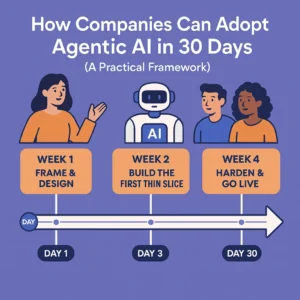In the dynamic landscape of marketing, the integration of artificial intelligence (AI) has revolutionized strategies, enabling businesses to optimize their efforts and reach their target audience more effectively. From analyzing consumer behavior to automating tasks, AI tools have become indispensable for marketers seeking to stay ahead in the competitive market.
In this blog, we’ll delve into the top 5 AI tools that are reshaping marketing strategies.
Top 5 AI Tools for Marketing
- Jasper AI: Jasper AI is an advanced content generation tool that uses natural language processing (NLP) to create high-quality, engaging content in various formats, including articles, blog posts, and social media posts. It helps marketers save time and resources by generating content ideas and even outlines, thus streamlining the content creation process.
- Grammarly: Grammarly is more than just a grammar checker; it’s an AI-powered writing assistant that helps marketers enhance the quality and clarity of their content. From correcting spelling and grammar mistakes to suggesting style improvements, Grammarly ensures that marketing copies are polished and professional, thereby boosting engagement and credibility.
- Surfer SEO: Surfer SEO utilizes AI algorithms to analyze and optimize website content for better search engine rankings. It provides detailed insights and recommendations based on extensive data analysis, allowing marketers to fine-tune their content strategy and improve their website’s visibility in search results.
- Phrasee: Phrasee is an AI-powered marketing tool specifically designed for crafting compelling email subject lines and marketing copy. By analyzing language patterns and past performance data, Phrasee generates personalized and optimized content that resonates with target audiences, ultimately increasing email open rates and conversions.
- Mailchimp: Mailchimp is a popular marketing automation platform that leverages AI to help businesses manage their email marketing campaigns more effectively. With features like predictive analytics and audience segmentation, Mailchimp enables marketers to deliver targeted messages at the right time, driving engagement and ROI.
AI in Marketing
- Personalization: AI enables marketers to create personalized experiences for customers by analyzing their behavior, preferences, and demographics. This leads to higher engagement and conversion rates as consumers feel more connected to the brand.
- Predictive Analytics: AI-powered predictive analytics tools forecast future trends and consumer behavior based on historical data, helping marketers make informed decisions and anticipate market changes.
- Automation: AI automates repetitive tasks such as email marketing, social media posting, and data analysis, allowing marketers to focus on more strategic activities and improve overall efficiency.
- Optimization: AI tools like A/B testing platforms and website optimization software optimize marketing campaigns in real-time by analyzing performance metrics and making adjustments for maximum effectiveness.
- Content Generation: AI-driven content generation tools assist marketers in creating high-quality content at scale, reducing manual effort and ensuring consistency in messaging.
- Customer Insights: AI algorithms analyze vast amounts of data to extract valuable insights about customer behavior, preferences, and sentiments, enabling marketers to tailor their strategies accordingly.
- Chatbots: AI-powered chatbots provide instant customer support and assistance, enhancing the overall customer experience and driving engagement across various channels.
- Image Recognition: AI technologies such as image recognition software help marketers identify trends, monitor brand mentions, and analyze user-generated content for actionable insights.
- Social Media Listening: AI tools monitor social media conversations in real-time, allowing marketers to track brand mentions, sentiment, and emerging trends, and engage with customers more effectively.
- Fraud Detection: AI algorithms detect fraudulent activities such as click fraud and payment fraud, safeguarding marketing investments and maintaining the integrity of campaigns.
Conclusion
The integration of AI into marketing strategies has unlocked new possibilities for businesses to connect with their target audience, drive engagement, and achieve tangible results. From content creation to campaign optimization, AI tools empower marketers to work smarter, not harder, by leveraging data-driven insights and automation. As AI continues to evolve, its role in marketing will only become more prominent, reshaping the industry and setting new standards for success. Embracing AI technologies is not just a trend but a necessity for businesses striving to thrive in today’s competitive market landscape.





